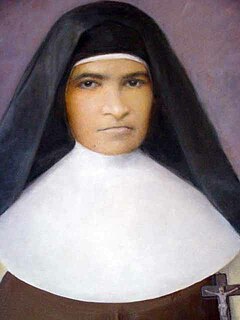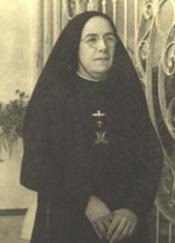Related Research Articles

Blessed Adèle de Batz de Trenquelléon – known as "Marie of the Conception," her religious name– was a French Roman Catholic professed religious and the co-founder of the Marianist Sisters which she founded alongside Blessed William Joseph Chaminade. As a child, her desire had been to become a Carmelite nun, though this desire never materialized; she instead focused herself on serving the poor wherever and whenever she could. Her order was founded with the intention of serving the poor and supporting the Sodalities of the Immaculate Conception that were started by Father Chaminade and supported by Venerable Marie-Thérèse Charlotte de Lamourous as missionaries of Mary thus combining certain aspects of the Carmelite charism with this impulse to balance the aspirations of the two co-founders.

Blessed Candelaria de San José was a Venezuelan Roman Catholic professed religious and the founder of the Carmelite Sisters of Venezuela - also known as the Carmelites of Mother Candelaria. The death of her parents in 1870 and 1887 prompted her to assume household responsibilities though in 1900 set her heart on aiding others in her area; this started in 1903 when she served as the director of a new hospital though she also tended to ill people during epidemics and conflicts that broke out over time.

Maria Candida of the Eucharist - born Maria Barba - was an Italian Roman Catholic professed religious of the Discalced Carmelites. Barba desired to become a professed religious in her adolescence but her parents forbade this and she was forced to wait two decades for her to realize her dream; she entered the order after her parents died though alienated her brothers in the process who refused to ever see her due to their resentment towards her decision. Barba became a noted member of her convent in Ragusa and she served as prioress for an extensive period in which she fostered a rigid adherence to the order's rule so as to live the fullness of its charism. Her devotion to the Eucharist was a focal point for her spiritual thinking and her own life and she wrote to an extensive degree on the Eucharist and its importance.
Maria Schininà, also known by her religious name Maria of the Sacred Heart of Jesus, was an Italian Roman Catholic nun and the founder of the Sisters of the Sacred Heart of Jesus (1889). Her adolescence demonstrated no particular spiritual emphasis though the death of her father and the marriage of her brother prompted a sudden inner conversion that saw her reach out and collaborate with the ill and the poor; she began in 1885 the foundations for what would become the religious congregation that she set up in 1889.
Giuseppina Gabriela Bonino, also known by her religious name Giuseppina Gabriella of Jesus, was an Italian Roman Catholic professed religious and the founder of the Suore della Sacra Famiglia di Savigliano. Bonino dedicated her life to the ill and to orphans and did this in drawing upon her own experience in tending to her ailing father and to orphans in her hometown - all this prior to and after the establishment of her religious congregation.
Blessed Gaetana Sterni was an Italian Roman Catholic professed religious and the founder of the Sisters of Divine Will. Sterni's life became marred due to the deaths of close relations including her husband and sole child which prompted her to look towards an apostolate to aid others and to ease others' sufferings. The order she founded was dedicated to total consecration to Jesus Christ and to an active apostolate of evangelic zeal.

Rita Lopes de Almeida - in religion Rita Amada de Jesus - was a Portuguese professed religious and the founder of the "Sisters of Jesus, Mary and Joseph" religious congregation. She spread the faith in the spirit of evangelization across Portugal despite a period of anti-religious sentiment and even received some intimidating threats during the course of her apostolate due to this; her order was dedicated to tending to girls and it ferried them off to their parents when anti-religious sentiment intensified.

Blessed Maria Pia Mastena - born Teresa Maria - was an Italian Roman Catholic professed religious and the founder of the Religious Sisters of the Holy Face. Mastena fostered a deep devotion to the Holy Face of Jesus and tried to promote that devotion to others in her religious career as a nun. Mastena first desired the contemplative life but was denied this after she entered the convent since it was not a cloister. Instead she dedicated herself to teaching in several Italian cities after having left another convent and another religious order when she deemed contemplative life was not the life she felt God wanted for her. Her labors were dedicated instead to consolidating her new religious order which began to grow after World War II until her sudden death in 1951.
Saint Laura Montoya – known in religion as Laura of Saint Catherine of Siena – was a Colombian Roman Catholic religious sister and the founder of the Congregation of the Missionary Sisters of the Immaculate Virgin Mary and Saint Catherine of Siena (1914). She was well known for her work with Indigenous peoples and for acting as a strong role model for South American girls.

Giacomo Cusmano was an Italian Roman Catholic priest and the founder of the "Congregatio Missionariorum Servorum Pauperum" which is also known as the "Boccone del Povero". Cusmano also established the Sisters Servants of the Poor. He was beatified by Pope John Paul II on 30 October 1983.

Maria Teresa of Saint Joseph - Anna Maria Tauscher van den Bosch was a German Roman Catholic professed religious and the founder of the Carmelite Sisters of the Divine Heart of Jesus. Tauscher worked in Cologne and was removed from her position after she converted to Roman Catholicism in 1888 so founded a religious order in the Netherlands upon choosing the Carmelite charism for her life.

Assunta Marchetti was an Italian Roman Catholic professed religious and the co-founder of the Missionary Sisters of Saint Charles Borromeo Scalabrinians; she worked in Brazil from 1895 until her death. She has been beatified as a Blessed Mother. Her priest brother Giuseppe is titled as Venerable on the path to sainthood.
Blessed Antonia Maria Verna was an Italian Roman Catholic professed religious and the founder of the Suore di carità dell'Immacolata Concezione. Verna left her hometown when she was fifteen due to increasing offers of marriage and returned sometime later when she decided to pursue her religious vocation. Her emphasis was on catechism and founded her religious congregation to better teach catechism to children as well as to tend to ill people.

Teodora Fracasso - in religious Elia di San Clemente - was an Italian Roman Catholic professed religious from the Carmelites. Fracasso once had the name of "Agnes" during a stint in the Third Order of Saint Dominic. Fracasso's inclinations to become a nun stemmed from her childhood after having had a vision in 1911 in which Thérèse of Lisieux told her that she would become a nun; this realization came a decade later when she entered the convent in her native Bari where she remained for the remainder of her life.

Blessed Carolina Santocanale was an Italian Roman Catholic nun who assumed the name of "Maria of Jesus" and established the Capuchin Sisters of the Immaculata of Lourdes. Santocanale became well known for her treatment of the ill and the poor to whom she devoted her life and work to and was also a member of the Secular Franciscan Order.

Blessed Maria Scrilli was an Italian Roman Catholic who was a professed religious who established the Sisters of Our Lady of Mount Carmel - a branch of the Carmelite order. She later assumed the religious name of "Maria Teresa of Jesus" upon making her profession and in dedication to Saint Teresa of Ávila.
María Guggiari Echeverría – in religion María Felicia de Jesús Sacramentado – was a Paraguayan Roman Catholic professed religious from the Discalced Carmelite Order who also served in her adolescence as a member of Catholic Action. Echeverría entered the order despite the opposition of her parents and was a close friend of Saua Angel – a friend from Catholic Action who became a priest.

Clara Fey was a German Roman Catholic Nun and the founder of the Sisters of the Poor Child Jesus. Her life was dedicated to providing aid to the poor, with particular emphasis on education, first in Aachen and later in the Netherlands.

Julia Navarrete Guerrero - in religious Julia of the Thorns of the Sacred Heart - was a Mexican Roman Catholic professed religious and the founder of the Misioneras Hijas de la Purísima Virgen María. Navarrete first felt called to promote religious education from her adolescence while still a student before moving to the national capital where she met the Jesuit priest Alberto Cuscó who formed her in the religious life. Not long after this she became a nun and set about founding schools and missions across both Mexico and the United States where she first started in Texas. Her brother Juan María Navarrete Guerrero became the Archbishop of Hermosillo and whose beatification process is ongoing.

Piotr Kosiba - in religious Alojzy - was a Polish Roman Catholic professed religious and member from the Order of Friars Minor; he was often dubbed the "Holy Almoner" or the "Apostle of Goodness and the Poor. He was born to poor farmers and worked straight after his education as a shoemaker due to being unable to afford further education; he was likewise unable to pursue his dream of becoming a priest due to wanting to work to support his siblings. He joined the Franciscans as a religious brother instead in 1878 and worked as their cobbler and beekeeper while ministering to poor children and going around asking for alms for them. His apostolate continued in World War I when he would bring gifts to those affected.
References
- 1 2 3 4 5 6 7 Ines Murzaku (16 June 2017). "Unleashing the Feminine Genius: Mother Vincenzina Cusmano". National Catholic Register . Retrieved 16 July 2019.
- 1 2 3 4 5 6 7 "Vincenzina Cusmano". Cusmano. Retrieved 16 July 2019.
- 1 2 3 4 "Madre Vincenzina Cusmano". Parrocchia Santa Rosalia. Retrieved 16 July 2019.